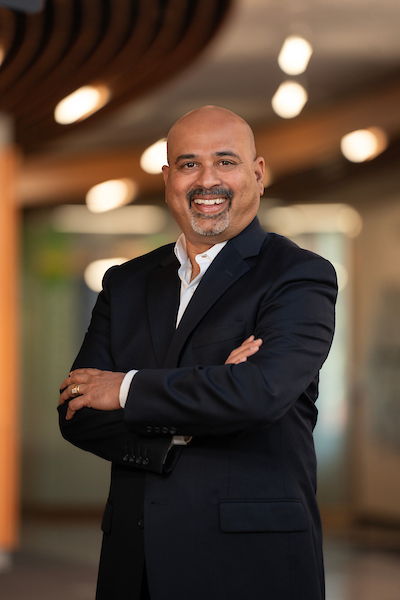
>> Executive Connections Stories
Keeping an open mind in your MBA journey: An interview with mentor Kal Subramanian

Kal Subramanian
Becoming a connected leader is one of the most important transformations Full-time MBA students undergo at Arizona State University. Executive Connections mentors like Kal Subramanian offer invaluable advice and support along the way — ensuring MBA students have proven business leaders to lean on and learn from as they identify and pursue what’s next.
“If you want to generate students who are future leaders of America and captains of industry, I think the strategy that W. P. Carey has used is very successful,” he says, emphasizing that the ideas MBA students learn in class will only translate in practical situations if they are paired with soft skills. “That’s why Executive Connections mentorship helps balance out the theoretical versus the practical.”
The mentorship program is impactful for both students and mentors, who get to know the future of business and help mentees reach their goals. “The most rewarding thing for me was to be in their shoes for a bit, enjoy those little things,” Subramanian says. “My children are grown up, so it helped me understand what they’re going through when they go into the business world, the kind of issues, opportunities, and struggles that they face.”
We spoke with Subramanian about his experience as a W. P. Carey School of Business mentor and the strong connections he’s formed with mentees, and why learning to be a connected leader is so important.
Q&A with Kal Subramanian
What is it that makes Executive Connections so unique and impactful? Mentors, alumni, and current students know best. This conversation has been edited and condensed.
Question: What made you decide to become an Executive Connections mentor?
Answer: When the Executive Connections opportunity came up through a friend and colleague at American Express, I jumped on it and said, “Yeah, let me know when it is, and I’ll sign up.” The opportunity came, unfortunately, during the pandemic, so they postponed it. But they got me on board this year. I’ve had an excellent experience, so I’ll do it again.
I can tell you from my personal experience of having been through an MBA program myself in the 1980s, that having that connection to soft skill development, relationship management, and networking is the longer marathon to success, rather than the sprint of academic learning. When you’re in your 20s going through grad school, you don’t realize the importance of having mentors who can tell you it’s important to form those emotional bonds and relationships with people, especially in a team working environment.
Q: As a mentor, how have you seen your mentees grow and develop?
A: I've already seen a big change in the emotional responses of my mentees. They have grown so much as people, and they realize that it's not just important to get all the straight As, but it's equally important to develop their emotional skills.
I was very touched recently when my mentees told me that they wanted to take me out to dinner or lunch. I said, “What? You guys want to take me out? You're on a student budget!” I said, “OK, I can do this. We can always meet.” They said, no, they wanted it to be a thank you for all the help that I have given them. I was very touched. I asked them specifically what difference I had made. Their answer was, “You don’t even know how much you’ve done for us just by giving us little tips and talking about all the things you’ve gone through in your life.”
All of my mentees happen to be from India, like me. They felt there was a certain cultural connection we were able to achieve. The life stories that I had were relevant to them. I didn’t even realize that those subtle tips and tricks actually helped them navigate the first year of being in a completely new country. Even though we have the internet now and we have so much more knowledge now than when I came to the U.S. in 1985, it’s still very valuable for them to meet somebody who’s been there, done that, and can relate to what they’re going through.
Q: What’s a favorite piece of advice you’ve given your mentees?
A: The simplest advice I gave them was the advice I received when I left India, and it’s still valid after 40+ years: Keep an open mind. That is so precious, especially in America with so much diversity. The old cliche about America as a melting pot is still true today.
Look at all of us. We’re such a diverse group of people. When I left, there was no internet, there was no communication except an idyllic view of America as a paradise. You just had to imagine what life would be like. Especially for my parents, who had no idea what I would be going through. So the advice they gave me was to keep an open mind and take advantage of everything that comes to you and learn from it.
That’s still true today for anyone, and especially for the international students that are here. Even though they know so much about America from movies, live streaming, and websites, it’s nothing like when you’re actually here in the midst of thousands of students with diverse backgrounds and value systems.
Q: What impresses you the most about the W. P. Carey Full-time MBA program and Executive Connections?
A: If you want to generate students who are future leaders of America and captains of industry, I think the strategy that W. P. Carey has used is very successful. One of my friends was a professor here in the Department of Supply Chain Management. He told me about how he’s working with the industry on case studies and partnerships to place students locally so they can get the experience they want.
But it’s a two-way street, right? The industry benefits from having a new generation of students come and work for them and bring their ideas. It also helps the students gain real-world experience. All of the ideas they learn about in class, in practical situations, it’s not really going to work unless you have those soft skills. That’s why Executive Connections mentorship helps balance out the theoretical versus the practical.
Q: What does leadership mean to you?
A: There’s something about someone who sets the vision and direction for a team. Very simply, leadership means you have a followership. If you have some people following you, you’re a leader. The only reason why someone can be a leader is because they have something to lead, a vision and direction that people can genuinely believe in, and trust for the leader.
To acquire leadership, you have to be a leader. It has to be genuine. A leadership characteristic that’s very important is someone who can take charge and provide guidance with honesty and integrity. It also means that a leader knows what they’re doing. They need to be a subject matter expert, otherwise, they wouldn’t be a leader in what they’re leading. You can go on an adventure, and the leader can be honest and say, “I don’t know exactly what I’m doing. We can all learn together. But I have the knowledge and techniques to show us the way.” That’s very important.